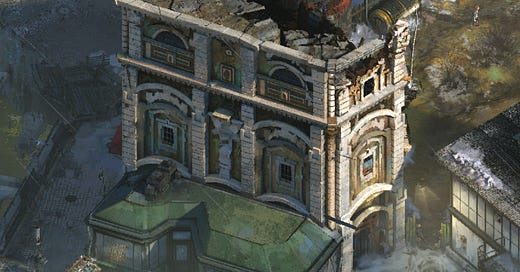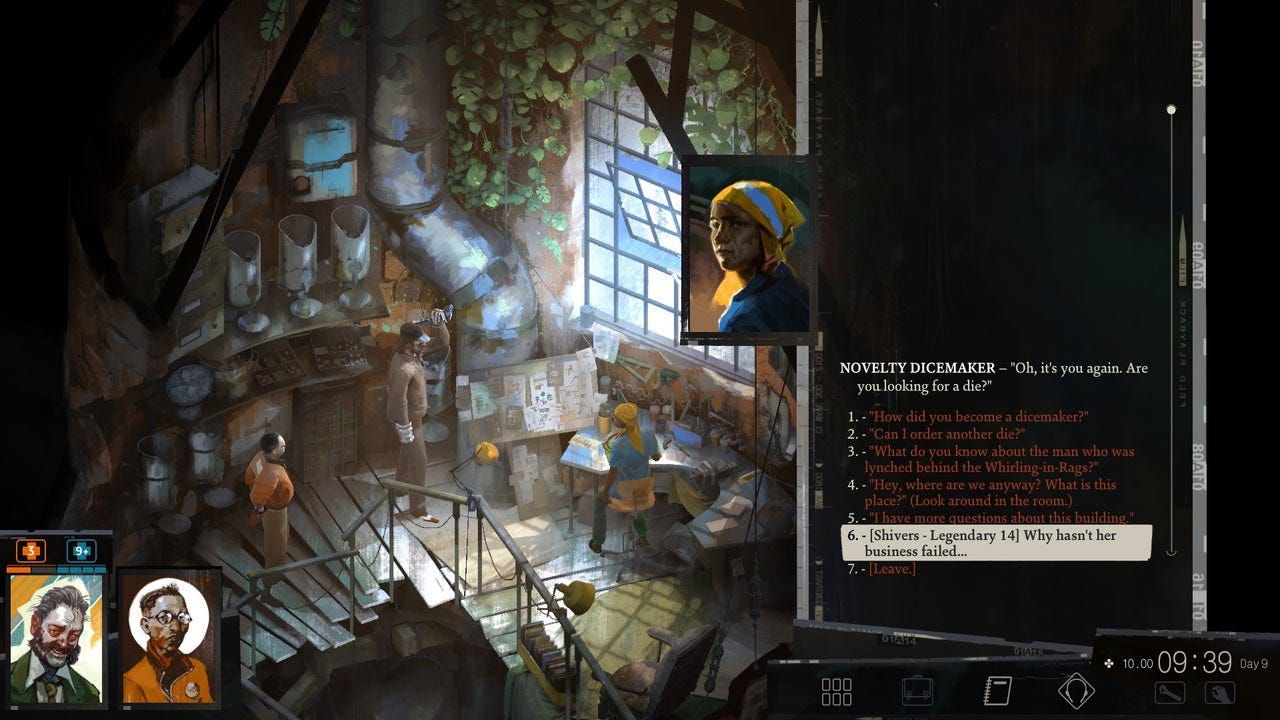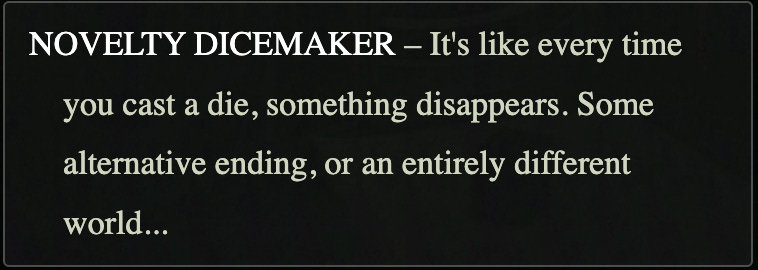Disco Elysium & the Revolutionary Respite of Revachol
Polyhedrons - Sea Power (Minor Disco Elysium spoilers ahead)
You wake up in the small, sleepy, seaside district of Martinaise in Revachol to the cheerful jingle of the local inn, Whirling-in-Rags. You feel like shit. Your room looks like shit. Your face looks like shit. You don't know where you are, who you are, and why the hell your tie is on a ceiling fan (think hard, and you might understand why).
You're an amnesiac alcoholic, stumbling and bumbling his way through life in a haze of narcotics. Everyone you meet treats you with contempt and disgust while you're still stuck wondering what the hell you could have done to make them hate you so much. Turns out - quite a bit.
Through an approximately 20-hour gameplay - shorter if you're a fast reader, or by speed-running (which is highly discouraged because it's the equivalent of skimming a book) - you get to know the world around you in its dreamy, cobbled landscape, watercolour scheme, and sweetly melancholic background music. You find out that you’re a detective, sent to the small town of Martinaise in this city named Revachol to solve the grisly murder of a man hanging outside of the inn you’re in. You still don’t have any fo your memories.
The city of Revachol is the virtual equivalency of a Post-Soviet Eastern Europe, likely inspired by the creator’s Estonian roots. Every construction you see and every character you interact with paints a picture of Revachol as a heavily industrialised city reduced to an exoskeleton by the throes of war and conflict.
Without any major spoilers, there’s a Doomed Commercial Area in the middle of the square that you are meant to explore. From the very beginning, when you are locked out of the area, calling the various businesses on the intercom from the outside gives you either no answer or a recording. You can see a literal crater on the roof of the Doomed Commercial area, a “skylight” that’s the only source of visibility (apart from your torch) as you roam through the ruins of the various failed businesses, including that of an ice cream shop whose ice bear fridge still remains (and runs!).
You trudge through endless piles of garbage, shuffling through in attempts to find something that’s actually worth the plunge. Of course, entering the Doomed Commercial Area is worthwhile for you as a detective (SPOILER ALERT: you stash the murder victim in the fridge to preserve the biological clues, a kind of testament to how awful the budget cuts are).
But none of this junk seems remotely worthwhile for anyone that isn’t investigating a murder or trying to get a basic sensing of who they are and where they’re at (because of the aforementioned memory loss). Martinaise is mentioned by its residents to be one of the poorest district in Revachol, a decrepit district full of heavy drinkers, kids addicted to meth, and a union boss that ham-fistedly attempts to retain power by any means available. It’s a run-down place where everyone seems to be barely hanging on by a thread - devoid of any sense of hope or purpose.
The city of Revachol is confused. All the strains of political ideology possible have failed the citizens again and again, to the point by which no one knows what to believe in anymore. Communism has defaced the city. The Doomed Commercial Area that shows how capitalism and market forces has forsaken them as well - on a macroeconomic level, quantitative easing as a “market mirage” had sent the economy into the depths of the recession it continues to be mired in. Despondency and stagnancy hangs in the air like fog.
But within the Doomed Commercial Area is a secret area in the chimney you can access by knocking on closed shutters. The Novelty Dicemaker, with her bright yellow headscarf, resides in this sun-lit roomed lined with ivies.
Her business of making novelty dice is still successful, she tells you. It’s a lucrative, niche sector that pays her enough for her craft. The dicemaker’s warmth, found at the very top of the Doomed Commercial Area, comes as a glimmer of hope in contrast to the depressing bowels of the basement.
It is important, too, that she is a dicemaker of all professions. She talks about probabilities and the various possibilities of the turns of fortune.
Well, Disco Elysium is fundamentally a DnD-style game, so it is necessarily about dice and fate. But what’s important is how this relates to the game as a whole.
The Novelty Dicemaker and the presence of dice in itself does not represent any sort of optimism. Even hope is pushing it a tad too far. It’s merely a reminder that there’s a possibility that something will push through, and that a path will be carved — for the main character himself, who is clearly in a shit personal situation, but also for Martinaise and Revachol.
Novelty Dicemaker: "Except I've weighted the die. When you try rolling it, you realize that each time it gets you exactly the same result -- God is indifferent. This is our curse."
If God is indifferent, then perhaps that leaves some room for human autonomy.
Your MC’s journey parallels that of the city. Will you be a Sorry Cop and apologise for every transgression in your forgone memory, or will you be a Fascist and call your Asian partner a slur? Will you play up your ego and be a Superhero Cop, constantly jacked on speed and various other narcotics enough to transcend to another realm of mental existence entirely, to ignore the burgeoning pressure of what seems to be the end of the world?
In the most neutral sense, Disco Elysium is a distinctly masculine game. Your playable character is male, your companion is male, the creator is male - but I bring this up because the central conflict behind the game mirrors a core struggle in men. Grappling with loneliness may be a gender-neutral, universally human experience, but the lens by which this is shown, through the eyes of the MC, is so culturally masculine.
Disco Elysium displays, in all its glory, the traditionally masculine overblown ego that belies something fundamentally broken deeper inside, the methodical self-deprecation in response to that, all with the background context of the practice of pining over an idealised ex-lover who has long moved on and forgotten who you are.
But the main character you play in Disco Elysium is specifically this guy because he is someone who has all the autonomy in the world, because the power structures in place benefit him. He’s a detective, a policeman in a position of power. He’s white, which means he can choose to be racist in a way his police partner cannot. He’s, as a mentioned above, a man. All these factors culminate in the fact that in this poor district he can do whatever he want, get away with almost everything. In fact, he trashes his hotel room, harasses almost everyone in town, and crashes his police car (plus, loses his gun and ID), and he not only still has his job, he’s still able to question and manipulate everyone in town. Various other characters (women in particular) are shown to have very little of such allowances, with heavy consequences for a fraction of what Harry does.
Even for someone with so much autonomy, your choices feel like they are inconsequential. What route you take is apropos of nothing when it comes to uncovering the truth, which fulfils your role as The Detective. In fact, your choices are often laughed at — even if you take what seems to be “ethical actions” (read: communist) when it comes down to it, you are criticised by the various characters for hypocrisy or for being too weak and unassertive. Side quests are denoted as you wasting time on the investigation.
In a way, this parallels the real world. Your actions, what you care about, your struggle — it all doesn’t really matter in the big picture. Rarely are real life villains that transgress moral boundaries given their comeuppance. You can go off and work for Lockheed Martin today and actively work to destroy lives and homes if you so wish. Even if you don’t want to be complicit in this capitalist machine, most people have to for the sake of survival. Morality isn’t a choice, it’s a privilege. We’ve all heard these lines of reasoning, and used them to justify our day-to-day decisions.
But the simple question is — what could matter more than the choices we make? What could matter more than our personal attempts to shape a world that minimises cruelty and rights injustices, and our commitment to making the right choices — especially when we’re faced with the horrendous acts of depravity that we see today?
Of course, this is all rather nebulous and idealistic, and there’s a lot of Disco Elysium I didn’t want to cover because of spoilers. It’s really a rewarding game to discover on your own, especially if you’re interested in political theory or Eastern European zeitgeist, shoutout Justin for recommending it — I’ll probably do a longer analysis, spoiler-full, at a later date.
:3








